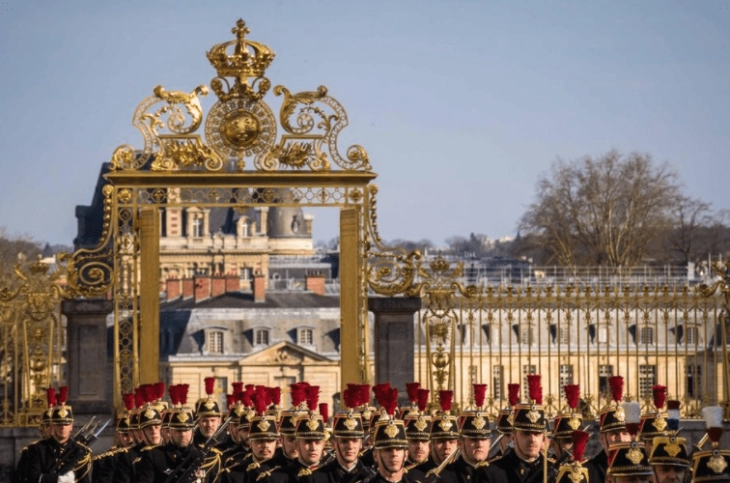EU leaders push for Ukraine ceasefire at start of Versailles summit

Versailles, France, 10 March 2022 (dpa/MIA) - EU leaders were considering how to create the conditions for a ceasefire in Ukraine on Thursday as they met at the historic Palace of Versailles near Paris for an informal summit.
Referring to an hour-long phone call with Russian President Vladimir Putin and German Chancellor Scholz earlier in the day, French President Emmanuel Macron said the conditions for a ceasefire tabled by the Kremlin leader were "not acceptable" to any of those involved.
"So the question is, is Mr Putin ready to re-engage honestly and propose something?" Macron said before entering the summit venue, adding that he would speak again with Putin in the coming hours.
European Council President Charles Michel reiterated that the EU leaders would consult on measures that could pave the way for a ceasefire.
"I think that we took Russia by surprise because we were firm, we were strong, we were united," he said. "It's not enough - we need to identify together what could be the following steps ... in order to get a ceasefire as soon as possible."
The EU's 27 heads of state are coming together after a frantic two weeks of supplying arms to Ukraine, sheltering nearly 2 million people and signing off on three rounds of massive sanctions on Russia for its invasion of its neighbour.
Ukraine's hopes for quick entry to the European Union were dealt a fresh blow at the start of the summit, with the leaders of Germany and the Netherlands among those to dismiss them as unrealistic.
"There is no such thing as a fast-tracking of accession - that doesn't exist," Dutch Prime Minister Mark Rutte said.
Scholz referred to an association agreement the EU and Ukraine reached in 2017 to deepen political and economic ties.
"It is very important that we continue to pursue the things we have decided in the past - this is the course we must follow," the German chancellor said.
Ukrainian President Volodymyr Zelensky has repeatedly urged the EU to expedite Kiev's membership bid in light of the Russian invasion of his country.
"Prove that you are with us," Zelensky told a special sitting of the European Parliament last week.
Membership of the bloc tends to be a lengthy, technical and politically fraught process, during which countries have to align with EU rules and values.
A draft statement of summit conclusions seen by dpa also pours cold water on Ukrainian hopes for quick accession. It says "Ukraine belongs in the European family," but does not make any mention of taking the application further.
The first day of the two-day event in Versailles is to focus on bolstering the bloc against the economic impact of the war and how to wean the EU off Russian energy imports, which account for more than 40% of its overall consumption.
Plans published by the European Commission on Tuesday outlined the bloc's shift away from Russian gas before 2030. Moscow's previous threats to suspend gas supplies have injected urgency into the discussions.
Some EU member states are pushing for new rules to allow more borrowing to tackle high energy prices during this transition but are meeting resistance. Greece and Spain are also calling for an overhaul of the EU's energy market to address prices.
Italian Prime Minister Mario Draghi threw his weight behind an EU plan to jointly issue bonds to finance energy and defence spending as the bloc copes with the fallout of the war.
"Italy and France are completely on the same page on this front," Draghi said, adding that the subject would be discussed at the summit.
Earlier on Thursday, the commission said subsidized loans and limited grants for businesses negatively impacted by the war in Ukraine and the sanctions subsequently imposed on Russia were on the table to help protect the bloc's economy.
Further measures to support EU member states near Ukraine hosting hundreds of thousands of people fleeing the war are also to be addressed.
Calls for EU member states to invest more in defence spending are also included in the draft statement.
The move comes after the bloc provided €450 million ($497 million) in arms to Ukraine, a historic EU first to arm a non-EU country in a conflict.







